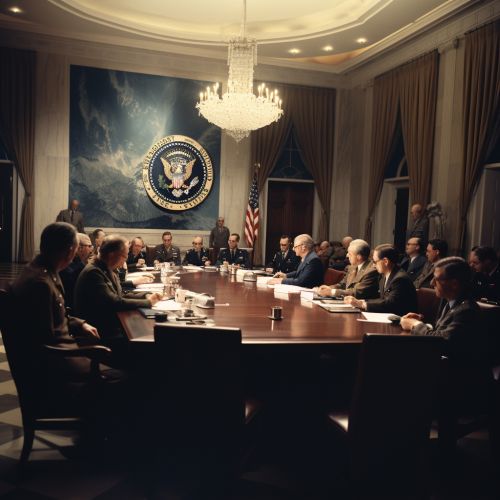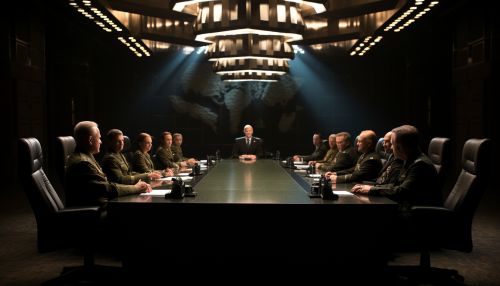National Security Council
Overview
The National Security Council (NSC) is a principal forum used by the President of the United States for consideration of national security, military, and foreign policy matters with senior national security advisors and Cabinet officials. It is part of the executive branch of the U.S. government.
History
The National Security Council was established by the National Security Act of 1947 (PL 235 - 61 Stat. 496; U.S.C. 402), amended by the National Security Act Amendments of 1949 (63 Stat. 579; 50 U.S.C. 401 et seq.). Later in 1949, as part of a reorganization of the Executive Office of the President, the staffing of the NSC was transferred to the Executive Office of the President.
Structure
The National Security Council is chaired by the President. Its regular attendees (both statutory and non-statutory) are the Vice President, the Secretary of State, the Secretary of the Treasury, the Secretary of Defense, and the Assistant to the President for National Security Affairs. The Chairman of the Joint Chiefs of Staff is the statutory military advisor to the Council, and the Director of National Intelligence is the intelligence advisor.
Function
The NSC's main role is to advise and assist the President on national security and foreign policies. The Council also serves as the President's principal arm for coordinating these policies among various government agencies.
Role in U.S. Government
The NSC is a principal part of the Executive Office of the President of the United States. It is managed by the Assistant to the President for National Security Affairs.
Membership
The NSC is composed of numerous permanent and non-permanent members. The President, Vice President, Secretary of State, and Secretary of Defense are all permanent members. The Director of National Intelligence and the Chairman of the Joint Chiefs of Staff are statutory advisers. The Assistant to the President for National Security Affairs, Chief of Staff to the President, Counsel to the President, and the Assistant to the President for Economic Policy are also regular attendees.
Meetings
Meetings of the NSC are chaired by the President. They are typically attended by the Vice President, the Secretary of State, the Secretary of the Treasury, the Secretary of Defense, the National Security Advisor, and others as decided by the President.
Criticism and Controversy
The NSC has faced criticism and controversy over the years, particularly in relation to its role in shaping U.S. foreign policy and its influence over the President's decision-making process.
See Also


